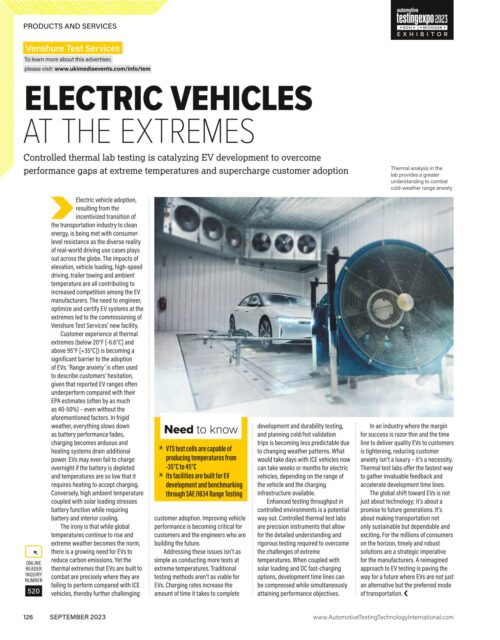
EVs at the Extremes or Extreme EVs
Controlled thermal lab testing is catalyzing EV development to overcome performance gaps at extreme temperatures and supercharge customer adoption.
SEPTEMBER 2023. Originally published in Automotive Testing Technology International
Electric Vehicle adoption, resulting from the incentivized transition of the Transportation Industry to clean energy, is being met with consumer level resistance as the diverse reality of real-world driving use cases play out across the globe. The impacts of elevation, vehicle loading, high speed driving, trailer towing and ambient temperature are all contributing to increased competition amongst the EV manufacturers. The ability to engineer, optimize and certify EV systems at the extremes is the genesis behind the commissioning of Venshure Test Services new facility.
Customer experience at thermal extremes (below 20°F and above 95°F) is becoming a significant deterrent to the adoption of EVs. “Range Anxiety” is often used to describe customer’s hesitation, given reported EV ranges often underperform their EPA estimates (often by as much as 40-50%) – even without the aforementioned factors. In frigid weather, everything slows down as battery performance fades, charging becomes arduous, and heating systems drain additional power. EVs may even fail to charge overnight if the battery is depleted, and temperatures are cold enough that it requires heating to accept charging. Conversely, high ambient temperature coupled with solar loading stresses battery function while requiring battery & interior cooling.
The irony is that while global temperatures continue to rise and extreme weather becomes the norm, the need for EVs grows to reduce carbon emissions. Yet, the thermal extremes that EVs are built to combat are precisely where they are failing to perform compared to ICE vehicles, only further challenging customer adoption.
Improving vehicle performance is becoming critical for customers and the engineers who are building the future. Addressing these issues isn’t as simple as conducting more tests at extreme temperatures. Traditional testing methods aren’t as viable for EVs. Charging rates increase the amount of time it takes to complete development and durability testing while planning cold/hot validations trips is becoming less predictable with changing weather patterns. What would take days with ICE vehicles now can take weeks or months for EVs depending on the range of the vehicle and charging infrastructure available.
One potential way out? Enhanced testing throughput in controlled environments. Controlled thermal test labs are precision instruments that allow for the detailed understanding and rigorous testing required to overcome the challenges of extreme temperatures. When coupled with solar loading, DC fast charging options, development timelines can be compressed while simultaneously attaining performance objectives.
In an industry where the margin for success is razor-thin, and the timeline to deliver quality EVs to customers is tightening – reducing customer anxiety isn’t a luxury; it’s a necessity. Thermal test labs offer the fastest way to gather invaluable vehicle feedback and accelerate development timelines.
The global shift towards EVs is not just about technology; it’s about a promise to future generations. It’s about making transportation not only sustainable but dependable and exciting. For the millions of consumers on the horizon, timely and robust solutions are a strategic imperative for the Manufacturers. A reimagined approach to EV testing is paving the way for a future where EVs are not just an alternative but the preferred mode of transport.
